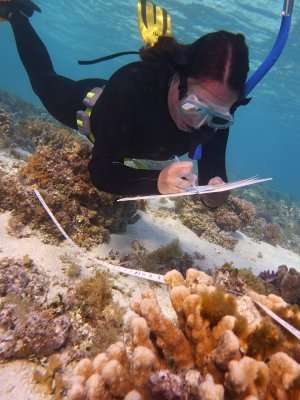Combination of light and temperature naturally regulate algal abundance

A two-year study by University of Queensland researchers has found the amount of algae on a coral reef is influenced by interaction between light and temperature, as well as by human impacts.
Global studies have long linked human activities to an increase in algae and the decline in reef-building corals, but have not focused on the impact of natural changes in the environment.
A team of scientists from the ARC Centre of Excellence for Coral Reef Studies and UQ's Global Change Institute have tracked environmental conditions, reef composition and coral-algal competition across Heron Island, on the southern end of the Great Barrier Reef.
They discovered interactions between light and temperature also influenced algal levels.
UQ Ph.D. candidate Kristen Brown said changes in algal biomass influenced the composition and frequency of coral-algal interactions.
Until now, how environmental factors interact to control the abundance of algae have mostly been inferred from seasonal peaks.
"Competition between coral and algae can lead to reductions in coral growth and survival, which can have implications on the structure and function of coral reef ecosystems," Ms Brown said.
"Algae and their interactions with corals are more relevant than ever, especially given the rapidly degrading coral reef ecosystem dynamics."
GCI's Professor Ove Hoegh-Guldberg said a greater understanding of seasonal and spatial variation was important for interpreting the response of coral reef communities to any future disturbances.
The research, The dynamics of coral-algal interactions in space and time on the southern Great Barrier Reef', is published in Frontiers in Marine Science.
More information: Kristen T. Brown et al. The Dynamics of Coral-Algal Interactions in Space and Time on the Southern Great Barrier Reef, Frontiers in Marine Science (2018). DOI: 10.3389/fmars.2018.00181
Provided by University of Queensland




















